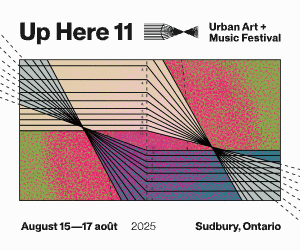Bria Refines The Art Of The Cover Song
Orville Peck cohorts find self-expression through emulation.
By Maggie McPhee
Photo by Augustin Farias
- Published on
“If it didn’t happen organically or naturally, or if it didn’t feel good as we were doing it, we stopped and moved on,” Salmena says, explaining that she had to forgo many songs she felt attached to during the recording process. “You can get really hung up on things, but I don’t want to do that anymore. I’d like recording to feel like an exploratory process that should never feel difficult. When it starts to feel difficult, maybe you’ve spent too much time on it.”
Salmena and Jennings also represent half of Toronto post-punk four-piece FRIGS, which completed its debut album at the end of 2019. Burnt out but still searching for meaning amid the pandemic and personal hardships, Salmena turned to country music and covers. “I was going through my own heartbreak, and country music really appeals to those types of feelings because it can be vulnerable and very sad,” she says.
As if to balance out the burden of intense introspection, Salmena shifted her artistic focus from personal songwriting to already existing works. She listened non-stop to artists like Marianne Faithful and Linda Ronstadt, two country stars known in their own right for memorable covers. But it was Mistress Mary’s “I Don’t Wanna Love Ya Now” which sparked the creative fire that grew into Cuntry Covers Vol. 1. “I sent it to Duncan and said, ‘This could be a fun thing to cover if you’re interested,’” she says. “He literally sent me an instrumental track—which is the track you hear on the record—two days later.”
It wasn’t long before Salmena joined Jennings at The Outside Inn, a hobby farm in Hockley Hills, Ontario, where they continued collaborating at the farm’s living-room-turned-studio. “We didn’t set out to make a cover record, we were just having fun,” Salmena says. Though an album was not the endgame, Cuntry Covers Vol. 1 abounds with the stuff of great concept albums. It seizes a mood with singular style, cohesive in its idiosyncrasy.


Reimagining songs already overflowing with their own respective legacies required perseverance. Covering Lucinda Williams’ “Fruits of My Labour” took what Salmena describes as “a stupid amount” of vocal takes. “I focused on how miserable I was at the time, and I had to harness what I was going through,” she says. “When you have to repeat those lyrics over and over again, they start to hold a different meaning for you. I was searching for my own voice in there and the only way I was able to do it was by going somewhere ultra-personal.”
With successful covers, the songs themselves become a medium, and the amount that’s left up to interpretation becomes a tightrope that’s difficult to navigate. “It’s a fine balance between honouring key elements that exist in whatever song you’re covering but also turning it on its head and making it your own,” says Jennings. “That’s what we were trying to do and I think, for the most part, we did an alright job.” They preserved the original’s double-tracked vocals on “I Don’t Wanna Love Ya Now” and borrowed the lush background vocals from John Cale’s “Buffalo Ballet.” For Waylon Jennings’ “Dreaming My Dream With You,” Salmena dives down into the depths of the country star’s iconic vocal register.
Still, their versions are distinctly Bria. Awash in reverb, churning with hypnotic percussions, and weighted by Salmena’s husky vocals, these iterations sound haunted and eternal, as if emanating from a transistor radio in an abandoned cathedral. Salmena and Jennings leaned into their love of bending and merging styles, enlisting a punk ethos lingering around from their work with FRIGS to subvert the classic country sound. “Breaking open these genre walls, you can see how everything is connected, and we wanted to show the interconnectivity that isn’t only what people know as country music,” says Salmena. “We’re a very small part of that, but it’s nice to be a part.”
Self-proclaimed ‘visitors’ in the country world, Cuntry Covers Vol. 1 is the first of many concepts Salmena and Jennings hope to do together. There may be a second volume, or they may head in another direction. One thing’s for certain: wherever Bria ‘visits’ next, they’ll be sure to leave a mark.
By Leslie Ken Chu
The rock stalwarts lean into vulnerability and nuance, proving that evolution doesn’t have to mean softening the blow.
By Cam Delisle
The pop veteran beamed into Rogers Arena Tuesday night with a glitchy arsenal of remixed hits—some faring better than others in her AI-styled end-of-the-world fantasia.













